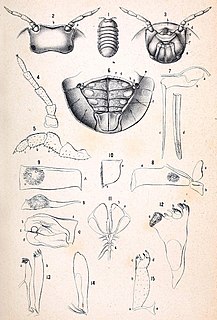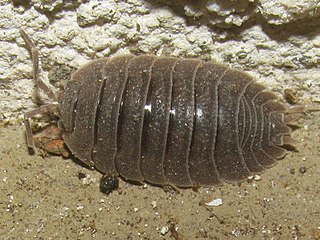 W
WAndroniscus dentiger, the rosy woodlouse or pink woodlouse is a species of woodlouse found from the British Isles to North Africa.
 W
WArmadillidium depressum, the Southern Pill Woodlouse is a large, relatively common British species of woodlouse characterized by its "splayed" appearance.
 W
WArmadillidium klugii is a lesser-known, rare Balkan, Dalmatia-based species of woodlouse, most distinguished by its colouration which resembles the red markings of the Mediterranean black widow Latrodectus tredecimguttatus. This is probably a kind of mimicry, to ward off predators that mistake the harmless animal for a venomous spider.
 W
WArmadillidium nasatum is a large, Britain-based species of woodlouse that has been introduced to North America, along with Armadillidium vulgare also found in other parts of Europe.
 W
WArmadillidium pictum is a species of woodlouse which occurs over most of Europe, except the Mediterranean Basin and Southeast Europe. In the British Isles, it is only known from a few sites, making it by some accounts, "Britain's rarest woodlouse". Since these sites are all remote from human habitation, in Cumbria and Powys, the species is thought to be native rather than introduced.
 W
WArmadillidium vulgare, the (common) pill-bug, potato bug, (common) pill woodlouse, roly-poly, slater, doodle bug, or carpenter, is a widespread European species of woodlouse. It is the most extensively investigated terrestrial isopod species.
 W
WHelleria brevicornis, the sole species of the monotypic genus Helleria, is a terrestrial woodlouse endemic to the islands and coastal regions of the northern Tyrrhenian sea. H. brevicornis is of interest due to its endemism, unique ecology and basal position in the suborder Oniscidea.
 W
WHyloniscus riparius is a species of woodlouse found in Central and Eastern Europe and subsequently introduced to North America. It is strongly associated with flood plains and can tolerate periods of up to eight weeks submerged under water. In North America, it was first found at St. John's, Newfoundland in 1951, and later in New York, New Jersey, Pennsylvania and North Carolina.
 W
WMesoniscus is a genus of woodlice, placed in its own family, Mesoniscidae, and section, Microcheta. It contains two species – Mesoniscus alpicolus and Mesoniscus graniger – that live in Central and Eastern Europe, mostly in and around caves.
 W
WMetatrichoniscoides leydigi is a species of woodlouse in the family Trichoniscidae that can be found in Belgium, Sweden, the Netherlands and the Britain I.
 W
WOniscus asellus, the common woodlouse, is one of the largest and most common species of woodlouse in the British Isles and Western and Northern Europe, growing to lengths of 16 mm and widths of 6 mm.
 W
WPhiloscia muscorum, the common striped woodlouse or fast woodlouse, is a common European woodlouse. It is widespread in Europe, the British Isles and is found from southern Scandinavia to the Ukraine and Greece. It has also spread to Washington and many states in New England, also the mid-Atlantic states of Pennsylvania and New Jersey, as well as Nova Scotia.
 W
WPorcellio dilatatus is a species of woodlouse in the genus Porcellio belonging to the family Porcellionidae. This species is widespread in Europe, and has also been introduced to North America from Western Europe. They are 15 millimetres (0.59 in) long, are brown coloured and striped. They can be found feeding on alder leaves, but mostly feeds on organic food substrates, such as lettuce in the wild. It also feeds on inorganic metal salts.
 W
WPorcellio monticola is a species of woodlouse in the genus Porcellio belonging to the family Porcellionidae that can be found in such European countries as Austria, France, Germany, Hungary, Luxembourg, Spain, and Switzerland.
 W
WPorcellio pumicatus is a species of woodlouse in the genus Porcellio belonging to the family Porcellionidae. This species is known to occur in Central Italy and on Sardinia. Adults reach about 15 millimetres (0.59 in) long and can mostly be encountered under stones.
 W
WPorcellio scaber, is a species of woodlouse native to Europe but with a cosmopolitan distribution. They are often found in large numbers in most regions, with many species preying on them.
 W
WPorcellio spinicornis is a species of woodlouse in the genus Porcellio belonging to the family Porcellionidae. This species is widespread in Europe, and has also been introduced to North America. It has wide spiny frontal lateral lobes.
 W
WPorcellionides pruinosus is a cosmopolitan woodlouse that is native to Europe, and is suspected to consist of very closely related species. Ten subspecies are recognised. The species carries Wolbachia endosymbionts, which is an alpha-proteobacterium that is known to modify the reproduction of their crustacean hosts by inducing cytoplasmic incompatibility or feminisation.
 W
WTrachelipus rathkii is a species of woodlouse in the genus Trachelipus. It can be found across Europe, except in the Mediterranean Basin.
 W
WTrachelipus ratzeburgii is a species of woodlouse in the genus Trachelipus belonging to the family Trachelipodidae that can be found in Austria, the Baltic states, Belgium, the Netherlands, the Czech Republic, France, Germany, Hungary, Italy, Poland, Romania, Slovakia, Switzerland and Scandinavia. The species has three subspecies:Trachelipus ratzeburgii illyricus (Verhoeff, 1901) Trachelipus ratzeburgii pedemontanus (Arcangeli, 1937) Trachelipus ratzeburgii ratzeburgii (Brandt, 1833)
 W
WTrichoniscus pusillus, sometimes called the common pygmy woodlouse, is one of the five most common species of woodlice in the British Isles. It is acknowledged to be the most abundant terrestrial isopod in Britain. It is found commonly across Europe north of the Alps, and has been introduced to Madeira, the Azores and North America.